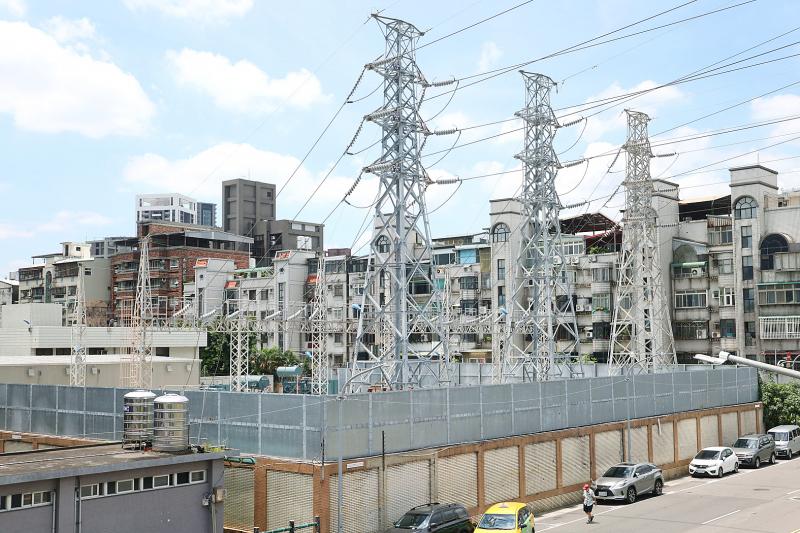State-run Taiwan Power Co (Taipower, 台電) yesterday said that the nation’s peak-hour electricity consumption this summer might exceed 40 gigawatts (GW) due to industrial use and high temperatures.
Peak power usage reached 39.94GW at 1:40pm on Thursday, which was a record and only 60 megawatts (MW) shy of the utility’s predicted maximum, Taipower data showed.
In contrast, yesterday’s peak consumption slid to 38.95GW, as torrential rain in the afternoon helped lower temperatures and reduce residential use of air-conditioning, it said.

Photo: CNA
It previously forecast that peak usage would climb to 40GW late next month or in August, but it is possible that the peak could be reached earlier, Taipower spokesperson Wu Chin-chung (吳進忠) said during the company’s annual shareholders’ meeting in Taipei.
The company was rerunning its prediction model and would revise its forecast at the end of the month at the earliest, while “there is a chance that peak power usage will be even greater than 40GW next month,” Wu said.
Although Taipower had anticipated heavier electricity consumption from semiconductor companies this summer, it did not predict the effects of Russia’s invasion of Ukraine, which has caused coal prices to surge, Wu said.
The rise in coal prices has reduced local cogeneration companies’ profits and made them less willing to sell power to local corporate customers, causing those customers to instead purchase electricity from Taipower, raising overall demand, Wu said.
For example, local cogeneration power plants produced on average 1.2GW last year, but 450MW on average during the day this year, Taipower said.
The utility and the Ministry of Economic Affairs are on Monday to determine electricity pricing, which would likely affect consumption, Taipower said.
If rates are raised, individual and corporate users would have an incentive to reduce electricity usage, and local cogeneration power plants would be more willing to sell electricity, as their rates are linked to Taipower’s pricing, it said.
“We still have faith that we will supply enough electricity this summer by coordinating the plants more efficiently and by having two major electricity generators at the Linkou Power Plant (林口發電廠) and Datan Power Plant (大潭電廠) back in service in the short term,” Taipower acting chairman Tseng Wen-sheng (曾文生) said.
The company yesterday reported a cumulative loss of NT$46.9 billion (US$1.58 billion) for the first four months of the year, compared with a pretax profit of NT$14.7 billion a year earlier, because of higher fuel prices, it said, adding that its aggregate losses widened to NT$85.3 billion as of the end of April.
Electricity consumption grew 3.3 percent annually in the first four months, it added.

CALL FOR SUPPORT: President William Lai called on lawmakers across party lines to ensure the livelihood of Taiwanese and that national security is protected President William Lai (賴清德) yesterday called for bipartisan support for Taiwan’s investment in self-defense capabilities at the christening and launch of two coast guard vessels at CSBC Corp, Taiwan’s (台灣國際造船) shipyard in Kaohsiung. The Taipei (台北) is the fourth and final ship of the Chiayi-class offshore patrol vessels, and the Siraya (西拉雅) is the Coast Guard Administration’s (CGA) first-ever ocean patrol vessel, the government said. The Taipei is the fourth and final ship of the Chiayi-class offshore patrol vessels with a displacement of about 4,000 tonnes, Lai said. This ship class was ordered as a result of former president Tsai Ing-wen’s (蔡英文) 2018

UKRAINE, NVIDIA: The US leader said the subject of Russia’s war had come up ‘very strongly,’ while Jenson Huang was hoping that the conversation was good Chinese President Xi Jinping (習近平) and US President Donald Trump had differing takes following their meeting in Busan, South Korea, yesterday. Xi said that the two sides should complete follow-up work as soon as possible to deliver tangible results that would provide “peace of mind” to China, the US and the rest of the world, while Trump hailed the “great success” of the talks. The two discussed trade, including a deal to reduce tariffs slapped on China for its role in the fentanyl trade, as well as cooperation in ending the war in Ukraine, among other issues, but they did not mention

Japanese Prime Minister Sanae Takaichi yesterday lavished US President Donald Trump with praise and vows of a “golden age” of ties on his visit to Tokyo, before inking a deal with Washington aimed at securing critical minerals. Takaichi — Japan’s first female prime minister — pulled out all the stops for Trump in her opening test on the international stage and even announced that she would nominate him for a Nobel Peace Prize, the White House said. Trump has become increasingly focused on the Nobel since his return to power in January and claims to have ended several conflicts around the world,

GLOBAL PROJECT: Underseas cables ‘are the nervous system of democratic connectivity,’ which is under stress, Member of the European Parliament Rihards Kols said The government yesterday launched an initiative to promote global cooperation on improved security of undersea cables, following reported disruptions of such cables near Taiwan and around the world. The Management Initiative on International Undersea Cables aims to “bring together stakeholders, align standards, promote best practices and turn shared concerns into beneficial cooperation,” Minister of Foreign Affairs Lin Chia-lung (林佳龍) said at a seminar in Taipei. The project would be known as “RISK,” an acronym for risk mitigation, information sharing, systemic reform and knowledge building, he said at the seminar, titled “Taiwan-Europe Subsea Cable Security Cooperation Forum.” Taiwan sits at a vital junction on